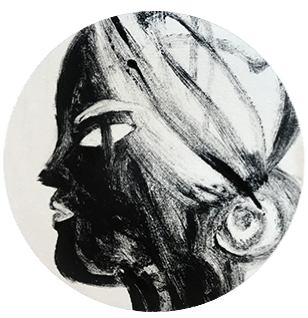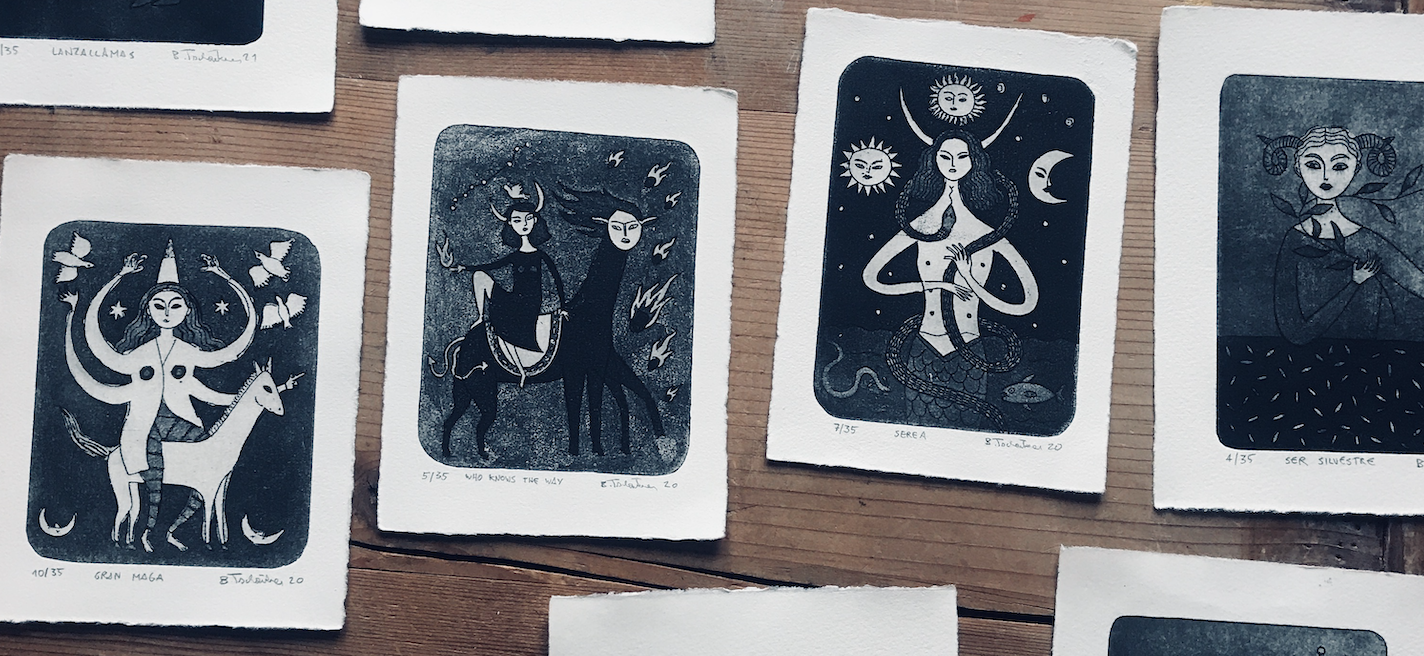In nature, green is not a color, green burns everywhere
(Blanca Wiethüchter)
You woke up for a Sunday like all the other Sundays on the peninsula, a Sunday that was like its sky, vast and greyish, a Sunday that only belongs to you, where you stroll around all day near the ocean and at sunset disappear with a book into one of the old bars in the Casco Viejo and have a glass of wine and a piece of tortilla and forget everything around you until the darkness fills the old streets and reminds you that no Sunday is eternal.
But this Sunday has just been born, and it belongs to you.
You live only a few steps away from the sea. On this day, as you step out, the sky and the ocean are enormous, you walk between them, there is nobody else in this great nothing, just some ships far away.
You walk on a mural near Praia das Lapas, the small beach between the Aquarium and the Tower of Hercules, thinking that you are too old to walk on murals, thinking that you are never too old to walk on murals, when you notice it: You notice that the grey of the sky is not the same grey as usual, that it has a strange orange hue. Why do you feel so hot on this October day?
You think of these enormous Sahara storms that every couple of years carry sand up until the Alps and soak the country in an intense foreign hue of orange, when for a few days, the Alps share their sky with Africa.
Later, at night, some friends invite you to the cinema next to the port. You watch Suspiria, terrifying and beautiful. And then, when you step out of the cinema, it rains ashes on your heads. The sky is completely black now, there are no stars, and the sailboats in the port are softly clanking, just as every night. What is happening?
You didn’t know? your friends ask, you didn’t hear about the fire?
You go have some beers in a bar in the Casco Viejo, sitting outside between the trees, and thick chunks of ashes fall on your arms from the sky. You hold them in your hand, you weigh their fragile shape and ask yourself what they once might have been – a leaf, a branch, a log from a house?
As you step inside the bar, you see the television blazing in a corner. There is a map of Galicia, ocean and forests, spangled with little orange fire pictograms. It looks beautiful and scary. On the map, you find yourself on an island between fire and water.
You remember your orange morning, and you realize that you did not first learn about this fire from your friends, nor from television: You knew it before, you experienced it from afar. You never saw that fire, but there, by the ocean, you felt it in your bones. Your skin felt the sky that was burning far away, and what the fire had eaten was raining onto you. Your body knew before you knew.
Only a few times in life we get grazed by the notion of being an animal, for one second, a few times in a lifetime, sometimes, when you break through the margins of the parallel world that humans have created for themselves, that synthetic world of safety on whose margins natural disasters, horrible accidents and the improbabilities of statistics are waiting.
It can happen when you get lost in a Canyon in an Arabian desert, or above the Atlantic ocean when turbulence wakes you in the plane at night, or when a thunderstorm surprises you when you reach the top of a mountain late in the day, or when you’re on a small boat and loose sight of the shore.
It happens when you are exposed to the elements and you realize that you are an element as well, nothing but. When you, for a moment, lose hold the thread of Ariadne which, you like to believe, leads you through the labyrinth of life, that succession of events, because you are an inhabitant of the world of statistics and probabilities, of regulations and insurances, the walls are made of stone, you can’t fall out of the frame, but you didn’t know there were abysses in the labyrinth, but yes, there are, and you fall and you realize that you’ve always been falling, that you can’t cling on that thread. Your hands are empty now, something is burning on your mind, and now, now you are an animal.
If you have been living the life of a metaphor, the life of cities and streets, now you are real. Now you have been given birth to, in another world, the world beyond good and bad, the world that is. A world that seems harsh and cruel to you, a world of injustice, but really it is a world of justice.
For some people, this falling becomes the moment of their death. Other ones almost die. And some just feel for the first time the fragility, and with it, the preciousness, of their lives. But all of us, before we die, we become an animal, we learn what it means to be an animal.
We might have led a life of lies, but we all become real before we die.
You slip back on our human dress, you go back to our house, to your bed and sleep, you sleep while the flames stand high around you. You know that someone will take care of you, because as opposed to the animal, who knows what it knows, you have a belief: humans have the fire brigade, and they have god, and this is our great comfort, even though – and we like to forget this – these two entities sometimes do seem to have opposite intentions.
I slept well during these days of the fire, but something in me did not. It was the animal inside me, locked between water and fire, that stayed awake all night to sniff the burnt air and to be alive, while I was asleep elsewhere. In the middle of the city, without leaving it, you are thrown out of the city and thrown into a forest, a burning one.
I still sometimes dream of that night where I became animal, and of that burning forests that I later stepped into, and they were green again, they smelled like life, but everything that smells like life smells like death, too, and now the flowers and the trees have become more fragile and more precious, because you know that these flowers that bloom can wither slowly or burn fast.
Image: Lanzallamas (flamethrower) aquatint etching. Available here


